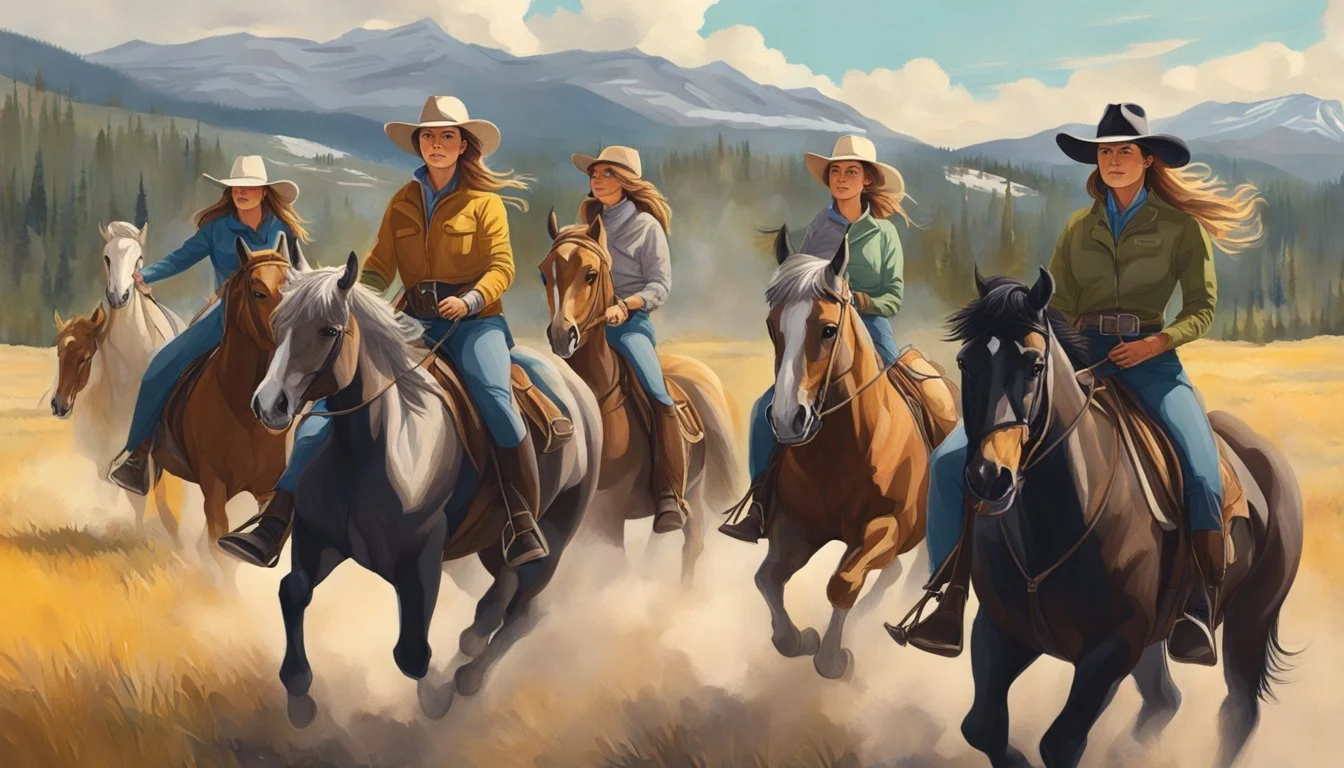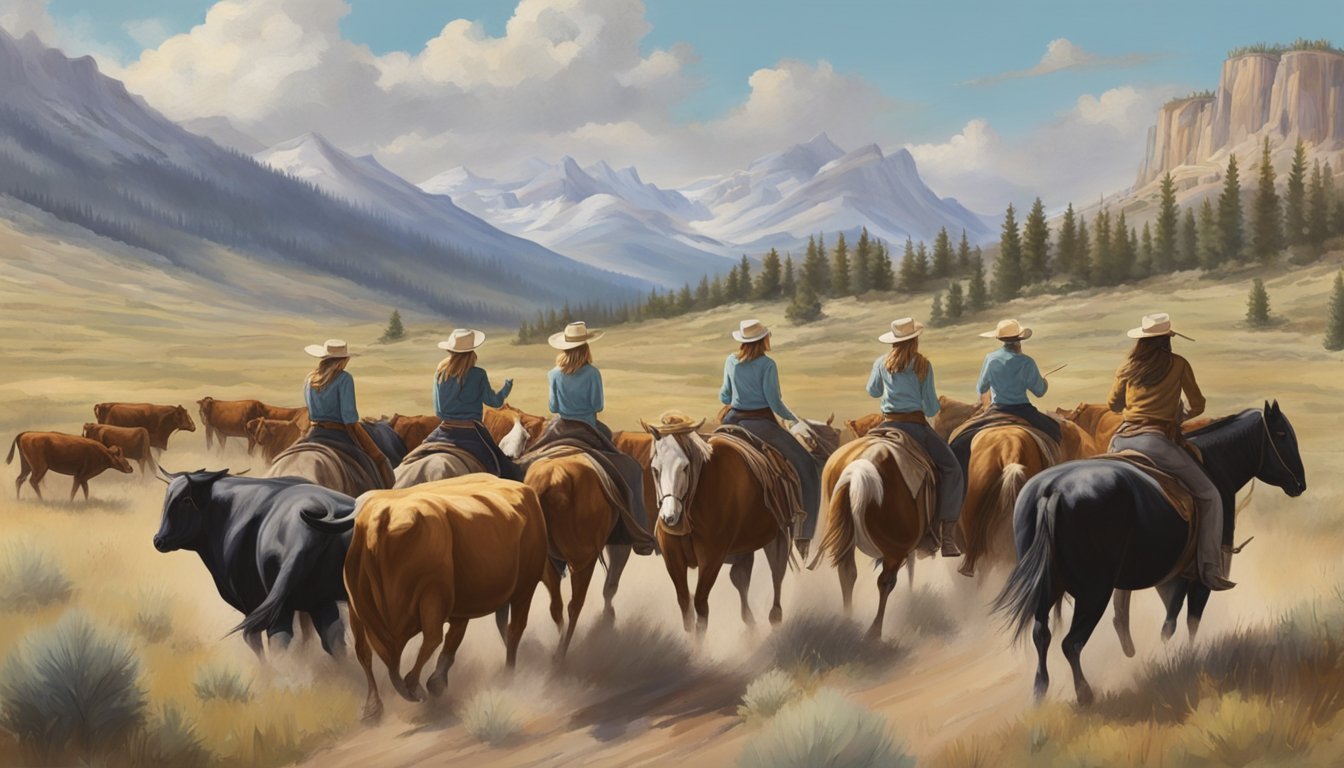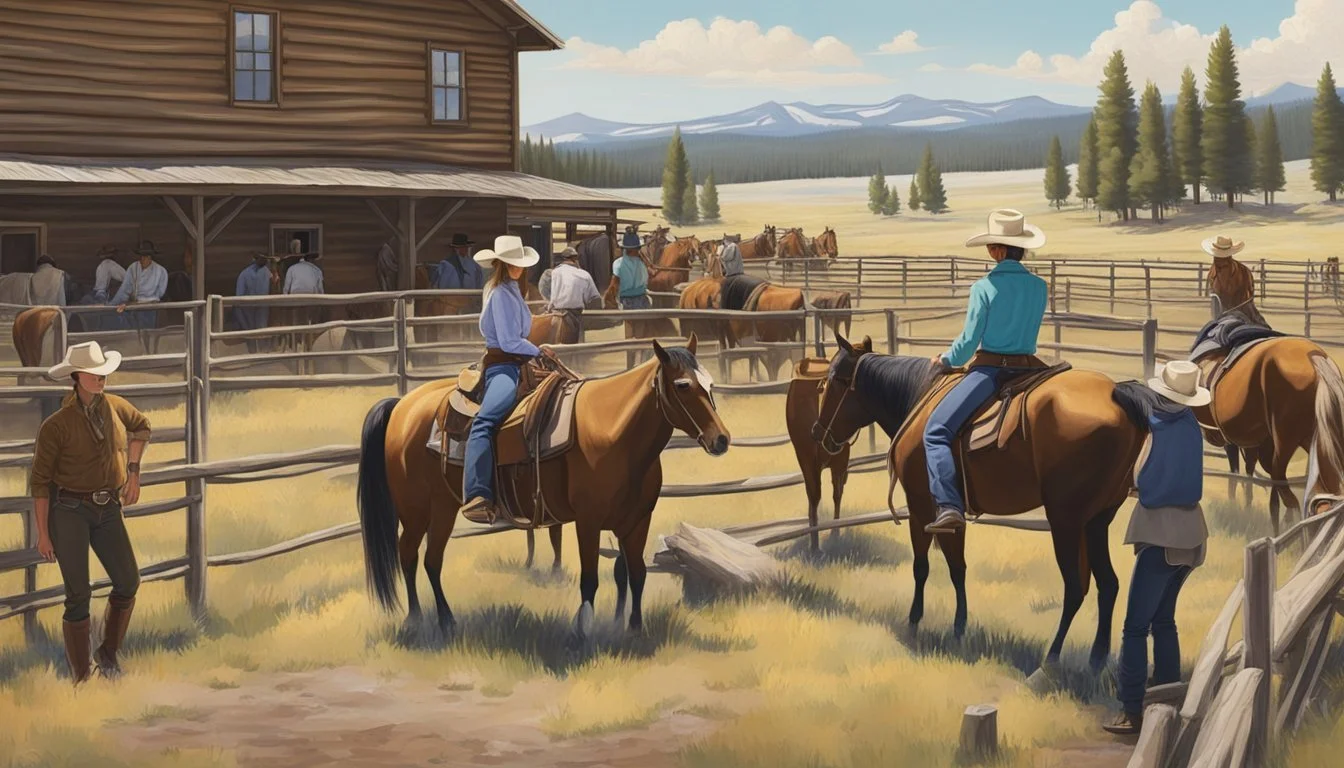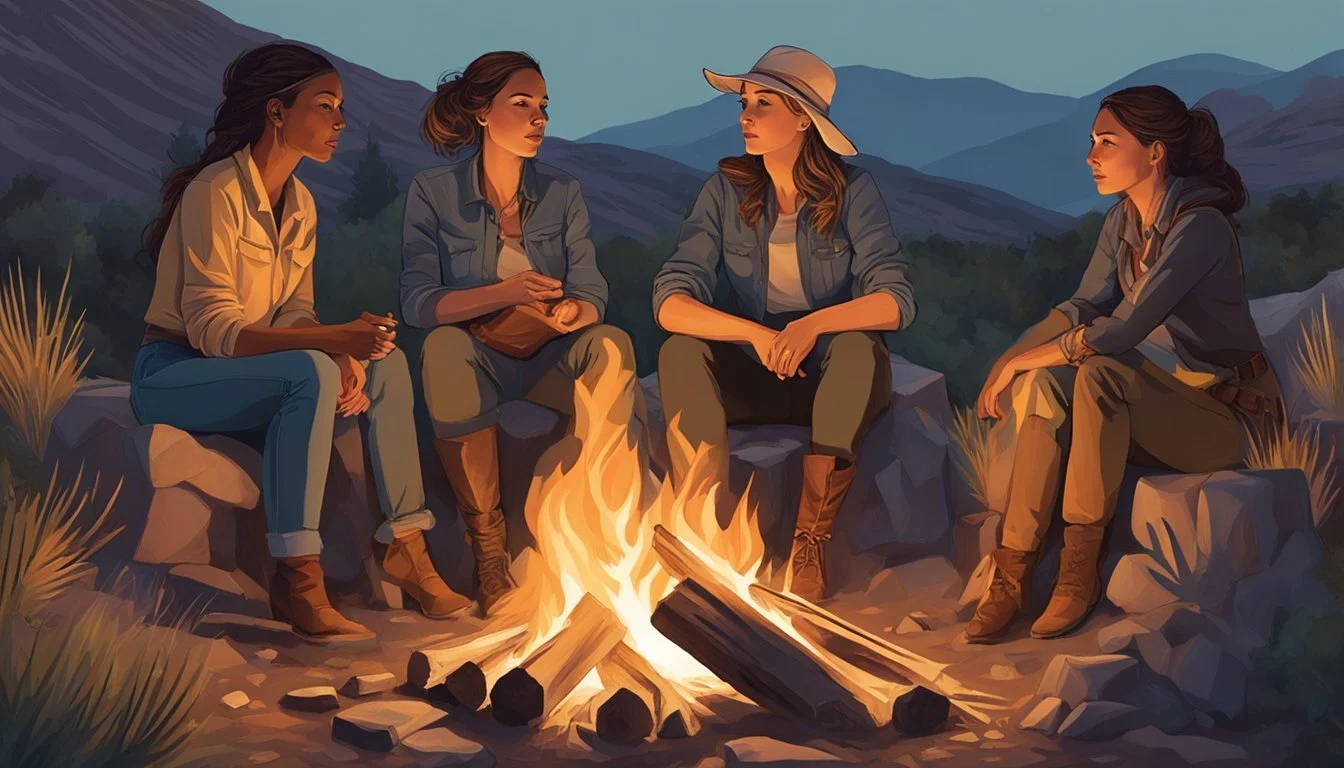Yellowstone's Women Shatter Stereotypes and Ignite a Feminist Revolution
Yellowstone, the gripping neo-Western drama, has captivated audiences with its complex characters and stunning Montana backdrop. Among the show's most compelling elements are its female characters, who challenge traditional Western stereotypes and redefine femininity in a male-dominated world. These women embody strength, resilience, and intelligence, proving themselves indispensable to the Dutton ranch and the series' intricate plotlines.
From Beth Dutton's fierce business acumen to Monica Dutton's unwavering moral compass, Yellowstone's women are far from mere supporting characters. They drive the narrative forward, often outmaneuvering their male counterparts and demonstrating that power in the modern West comes in many forms. The show's portrayal of these characters offers a fresh perspective on femininity in the neo-Western genre, blending traditional values with contemporary sensibilities.
The legacy of strong Dutton women traces back to Elsa Dutton from the prequel series 1883, setting the foundation for generations to come. As Yellowstone continues to evolve, its female characters remain at the forefront, challenging viewers' expectations and redefining what it means to be a woman in the rugged landscape of Montana's cattle ranches.
The Evolution of the Western Genre
The Western genre has undergone significant transformation, adapting to modern storytelling techniques and audience preferences. This evolution has revitalized a classic American genre, blending traditional elements with contemporary themes.
From Classic to Neo-Western
Classic Westerns often portrayed rugged individualism and stoic strength. Cowboys in chaps embodied self-reliance and a clear moral code. Neo-Westerns like "Yellowstone" present a more nuanced view of the American West.
These modern takes incorporate complex characters and moral ambiguity. They explore themes of family, power, and identity against a backdrop of changing landscapes. Neo-Westerns often feature strong female characters who break traditional stereotypes.
Taylor Sheridan, creator of "Yellowstone," has been instrumental in redefining the genre. His work blends classic Western elements with contemporary issues, creating a fresh and engaging narrative style.
The Influence of '1883' and '1923'
"1883" and "1923" have further expanded the Western genre's scope. These "Yellowstone" prequels offer historical context to the Dutton family saga. "1883" follows the family's arduous journey across the American frontier.
The series showcases the harsh realities of 19th-century westward expansion. It highlights the challenges faced by settlers, including disease, conflict, and environmental hardships.
"1923" bridges the gap between "1883" and "Yellowstone." Set in the early 20th century, it explores themes of Prohibition, the Great Depression, and the aftermath of World War I. Both series contribute to a richer, more diverse portrayal of Western history.
Yellowstone's Female Character Analysis
Yellowstone's female characters break stereotypes and challenge traditional gender roles in the neo-Western genre. These complex women navigate power struggles, family loyalties, and personal ambitions in a male-dominated world.
Beth Dutton: The Femme Fatale
Beth Dutton, portrayed by Kelly Reilly, embodies the modern femme fatale. Her sharp wit and ruthless business tactics make her a formidable force in the Dutton family's fight to protect their ranch. Beth's traumatic past shapes her actions, driving her fierce loyalty to her father and siblings.
Despite her tough exterior, Beth reveals vulnerability in her relationship with Rip Wheeler. This juxtaposition of strength and fragility adds depth to her character, making her both admired and feared by those around her.
Beth's corporate shark persona challenges gender norms in the Western setting. She uses her intelligence and sexuality as weapons, often outmaneuvering her male counterparts in high-stakes business deals.
Monica Dutton: Native American Representation
Monica Dutton brings a unique perspective to Yellowstone as a Native American woman straddling two worlds. Her marriage to Kayce Dutton places her at the center of conflicts between the Dutton ranch and the Broken Rock Indian Reservation.
Monica's character explores themes of cultural identity and preservation. She faces challenges in maintaining her Native heritage while navigating life on the Dutton ranch. This internal struggle reflects broader issues of Native American representation in media.
As an educator, Monica serves as a voice for her community. Her storylines often highlight the complexities of reservation life and the ongoing impacts of historical injustices on Native American populations.
Elsa Dutton: The Pioneer Woman
Elsa Dutton, featured in the prequel series 1883, represents the pioneer spirit of the American West. As the Dutton family's ancestor, she embodies the strength and resilience of women who helped settle the frontier.
Elsa's journey from naive teenager to hardened cowgirl showcases the transformative power of the Western landscape. Her experiences challenge traditional notions of femininity, as she adapts to the harsh realities of life on the trail.
Through Elsa's narration, viewers gain insight into the historical context of the Dutton family saga. Her character serves as a bridge between past and present, highlighting the enduring legacy of pioneer women in shaping the American West.
Summer Higgins: Environmental Activist
Summer Higgins introduces an environmental perspective to Yellowstone's complex web of land disputes. As an activist, she challenges the Dutton family's ranching practices and brings attention to ecological concerns.
Summer's character represents a modern contrast to the traditional Western archetypes. Her urban background and progressive ideals often clash with the rural, conservative values of Montana ranchers.
Through Summer's interactions with John Dutton and Beth, the show explores themes of conservation versus tradition. Her presence sparks debates about sustainable land use and the future of ranching in the American West.
Redefining Gender Roles within the Dutton Family
The women of Yellowstone challenge traditional gender norms while navigating complex family dynamics on the Dutton ranch. Their roles blend strength and vulnerability, often blurring the lines between masculine and feminine expectations.
Strength and Vulnerability
Beth Dutton embodies a fierce determination typically associated with male characters. She wields power in the boardroom and isn't afraid to use intimidation tactics. Yet Beth also reveals deep emotional wounds, particularly in her relationship with Rip.
Monica Dutton displays resilience in the face of cultural challenges. As an Indigenous woman married into the Dutton family, she advocates for her people's rights while adapting to ranch life. Her strength lies in maintaining her principles and identity.
Both women demonstrate that vulnerability can coexist with power, redefining notions of femininity in the neo-Western setting.
Ambiguity and Moral Complexity
The Dutton women often operate in morally gray areas. Beth's ruthless business tactics and sharp tongue contrast with her fierce loyalty to family. This duality makes her a complex anti-hero figure.
Monica grapples with conflicting loyalties between her Dutton ties and her Indigenous heritage. Her character challenges simplistic portrayals of Native American women in Westerns.
These ambiguities reflect the show's nuanced approach to gender roles, avoiding one-dimensional stereotypes.
Family Loyalty vs. Personal Identity
Beth and Monica both struggle to balance family obligations with individual aspirations. Beth's unwavering commitment to protecting the ranch often comes at a personal cost. Her choices challenge traditional expectations of women prioritizing marriage and motherhood.
Monica's journey involves reconciling her role as a Dutton wife with her identity as an Indigenous woman and educator. This tension highlights the complexities faced by women navigating multiple cultural expectations.
Their experiences demonstrate how modern women redefine their places within family structures while maintaining strong individual identities.
The Power Dynamics of Yellowstone Ranch
The Dutton family's control over Yellowstone Ranch shapes complex relationships and conflicts. Their influence extends beyond property lines, impacting the region's economic and political landscape.
Land Rights and Conservation
John Dutton fiercely defends his vast landholdings against external threats. He views the ranch as a legacy to be preserved for future generations. This stance often puts him at odds with developers and government officials seeking to acquire or regulate parts of the property.
The Duttons employ various tactics to maintain their grip on the land. These include leveraging political connections, manipulating local laws, and even resorting to intimidation when necessary. Their efforts to conserve the ranch's natural beauty and resources sometimes align with environmental groups, creating uneasy alliances.
Conservation becomes a double-edged sword for the Duttons. While it helps protect their interests, it also attracts attention from outsiders who see the land's potential for eco-tourism or resource extraction.
Ranch Life vs. Progress
The clash between traditional ranching and modern development is a central theme in Yellowstone. The Dutton Ranch represents a way of life increasingly threatened by urbanization and changing economic priorities.
John Dutton's commitment to preserving the cowboy culture puts him at odds with:
Real estate developers
Tourism industry
Tech companies seeking rural expansion
The ranch's workers often find themselves caught between loyalty to the Duttons and the allure of easier, more lucrative jobs in growing nearby towns. This tension creates a constant struggle to maintain the workforce needed to keep the ranch operational.
The Impact of Control and Manipulation
Power on Yellowstone Ranch is maintained through a complex web of control and manipulation. The Dutton family, particularly Beth and Jamie, employ cunning strategies to protect their interests.
Beth's sharp business acumen and ruthless tactics make her a formidable opponent in corporate battles. She uses her skills to:
Outmaneuver rival companies
Secure favorable deals for the ranch
Blackmail or coerce when necessary
Jamie's legal expertise provides another layer of protection for the family's interests. His knowledge of the law allows the Duttons to navigate regulatory challenges and exploit loopholes to their advantage.
The ranch's influence extends into local politics and law enforcement, creating a power structure that often operates outside traditional legal boundaries. This control allows the Duttons to maintain their dominance, but also breeds resentment and opposition from those who feel marginalized or threatened by their authority.
Cultural Phenomenon and Media Impact
Yellowstone has transformed from a TV series into a cultural force, reshaping perceptions of the American West and influencing media trends. The show's popularity has sparked widespread interest in Western lifestyles and landscapes.
The Role of Paramount Network and Paramount+
Paramount Network took a risk by green-lighting Yellowstone, a high-budget Western drama. The gamble paid off, with the show becoming the network's flagship series. Paramount+ capitalized on this success by offering exclusive streaming access to Yellowstone spin-offs.
The show's availability on multiple platforms expanded its reach. This strategy allowed viewers to engage with the Yellowstone universe through various channels, increasing fan engagement and loyalty.
Tourism and Cultural Influence
Yellowstone's stunning visuals of Montana landscapes sparked a tourism boom in the region. Fans flocked to filming locations, eager to experience the show's settings firsthand.
Local businesses benefited from increased visitor numbers. Many embraced the Yellowstone aesthetic, offering themed merchandise and experiences. The show's fashion also influenced Western wear trends, with retailers reporting spikes in cowboy boot and hat sales.
Yellowstone's Impact on Modern Television
Yellowstone revitalized the Western genre for contemporary audiences. Its success paved the way for other neo-Western series and films, demonstrating the enduring appeal of frontier narratives.
The show's exploration of complex themes like land rights and family dynamics resonated with viewers. This blend of traditional Western elements with modern storytelling techniques set a new standard for prestige television.
Yellowstone's strong ratings challenged the notion that streaming platforms dominated quality TV content. Its success on cable proved that well-crafted stories could still thrive in traditional broadcast formats.
Character Development and Actor Portrayals
The actors in Yellowstone bring depth and nuance to their roles, creating complex characters that evolve throughout the series. Their portrayals showcase the intricate relationships and personal growth central to the show's narrative.
Kelly Reilly as Beth Dutton
Kelly Reilly's portrayal of Beth Dutton is a standout performance in Yellowstone. Beth's character arc showcases her transformation from a ruthless businesswoman to a more vulnerable yet still formidable force.
Reilly embodies Beth's sharp wit and fierce loyalty to her family with intensity and precision. Her on-screen chemistry with Rip Wheeler adds layers to Beth's character, revealing softer aspects of her personality.
Throughout the seasons, Reilly skillfully portrays Beth's internal struggles, particularly her inability to have children and her complex relationship with her father, John Dutton.
The Evolution of Rip Wheeler
Rip Wheeler's character development is a testament to the show's nuanced storytelling. Initially introduced as the Dutton ranch's enforcer, Rip's backstory and vulnerabilities are gradually revealed.
His relationship with Beth Dutton serves as a catalyst for his growth, showcasing his capacity for love and devotion. Rip's loyalty to the Dutton family, especially John, remains a constant throughout the series.
As the show progresses, Rip takes on more responsibilities at the ranch, demonstrating his leadership skills and unwavering commitment to protecting the Dutton legacy.
Jamie and John Dutton's Complex Relationship
The dynamic between Jamie and John Dutton is one of the most intricate in Yellowstone. Their relationship is marked by tension, betrayal, and occasional moments of reconciliation.
Jamie's struggle for his father's approval drives many of his actions, often leading to conflicts within the family. His adoption revelation in later seasons adds another layer of complexity to their already strained relationship.
John's treatment of Jamie, alternating between harsh criticism and reluctant support, highlights the complicated nature of their bond. This father-son dynamic continues to evolve, keeping viewers engaged with its unpredictability.
Challenges and Themes Explored
Yellowstone's female characters face harsh realities and complex emotional journeys on the Dutton ranch. Their stories interweave themes of survival, love, and revenge against a backdrop of moral ambiguity and power struggles.
Survival and Gritty Realism
Beth Dutton epitomizes the gritty realism of Yellowstone's women. She navigates a cutthroat business world and family dynamics with razor-sharp wit and ruthless tactics. Her confrontations with corporate adversaries showcase her resilience and determination to protect the ranch at all costs.
Monica Dutton grapples with cultural identity as she straddles two worlds - her Native American heritage and life on the Dutton ranch. Her character explores themes of belonging and adaptation in a changing landscape.
The show doesn't shy away from depicting the physical and emotional toll of ranch life on its female characters. From branding cattle to facing armed threats, these women prove their mettle in traditionally male-dominated spheres.
Love, Revenge, and Resolution
Romance in Yellowstone is far from idyllic, often intertwined with power plays and vendettas. Beth's relationship with Rip Wheeler is marked by a fierce loyalty tempered by her past trauma and trust issues.
Revenge drives many of the women's actions, particularly Beth's long-standing feud with her brother Jamie. This plotline delves into themes of family betrayal and the lengths one will go to right perceived wrongs.
The female characters' pursuit of resolution often involves morally ambiguous choices. They navigate a world where traditional notions of right and wrong blur, forcing them to make difficult decisions to protect their interests and loved ones.
Kayce's wife Monica seeks justice for her community while balancing her role in the Dutton family, highlighting the complex intersections of love, duty, and cultural identity.
The Role of Female Stereotypes and Expectations
Yellowstone challenges traditional female stereotypes in the Western genre. The show presents multi-dimensional women who defy conventional gender norms.
Beth Dutton exemplifies this subversion of expectations. She is fierce, intelligent, and unapologetic in her pursuit of power and influence within the male-dominated ranching world.
The series also explores the complexities of motherhood through characters like Monica Dutton. She balances her roles as a wife, mother, and academic, showcasing the diverse experiences of modern women.
Yellowstone's female characters often face societal pressures and prejudices. They navigate these challenges with resilience and determination, refusing to be confined by outdated stereotypes.
The show highlights the strength of its female leads in various ways:
Strategic decision-making
Physical toughness
Emotional fortitude
Professional competence
By presenting women as integral to the plot and decision-making processes, Yellowstone breaks away from traditional Western stereotypes. This approach contributes to a more nuanced representation of femininity in the neo-Western genre.





